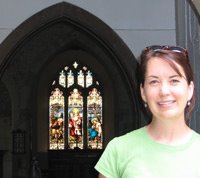18: Spiritual awakenings
If I had a bit of bravura and somewhat disguised perhaps-I’ll-deign-to-talk-to-you air on the outside, inside I was still more than slightly panicked, still struggling with the unexpressed and perhaps irrational fear that I had misstepped somehow, that all of this was too big for me. The service washed over me with a continual sense of the grace and goodness of God.
Being regularly exhausted submits me not only to mood swings but also to dramatic spiritual experiences. I don’t know how to explain them, except that in some ways you know things more fully and more clearly when you are physically quite at the end of yourself than when you are able to carry out your daily tasks without ever thinking your psyche might slip through a fissure in the fabric of the universe and you might never recover.
One day, after I left my job, I sat in the tiny sunroom of my townhouse at the café table that’s squinched into the corner by the french door, reading psalms and thinking about the utter truth of Jesus. In my exhaustion His character—His complete truth, the kind I have never experienced here—was clearer and more important and more true to me than it had ever been. I sat daydreaming in the sun and lost myself in it.
I was weary of the problems I’d had at work, of not being able to get people to listen to the complete story, always having to summarize and synthesize, and give them conclusions for which they didn’t understand all the background, and having them build on this scant foundation a thought system of their own about my work or the problems we were addressing that was not entirely true. Every experience, it seemed, was more complex than anyone else truly wanted to know, and thus they always had slight half-truths, and I felt scandalized, and misrepresented, and lost. And I began to sense that it is nearly impossible for any of us to be completely true, when the mass of raw material we are working with—the heart and soul and mind that form our thoughts and desires and words—is so completely faulty to begin with.
I realized then that Jesus knew all the exacts, everything the way it exactly happened, all the intricacies and dependencies and turns of phrase. And also that He was true in a way no one else ever would be—completely and thoroughly, with no shades of doubt, nothing motivated by pride, nothing muddy, everything clear and true and sound and trustworthy.
And this was so important to me as I sat in the sun that I thought about being in the presence of this complete truth and imagined declaring its goodness—His goodness—the way the angels do, maybe, proclaiming and honoring Him for who He is. So I pictured myself going around in front of Jesus everywhere He went in Heaven, preceeding Him, declaring Him to be faithful and true and calling the rest of Heaven to attention. And I quickly determined that that would get insanely annoying for all of eternity.
But in this case, in the folding chairs in the transept of Christ Church Cathedral, what hit me with full spiritual force in my exhaustion was the grace and goodness of God—that which I had begun to hope for in the everyday circumstances of my life, but not entirely expect. I kept hearing those words in my head, and as I looked up at the gorgeous ceiling I imagined this grace and goodness coming down to me—to me. I do not know what the readings were, but we sang a song about Jesus giving us strength for our daily tasks, and the prayers and the song and the readings and the sung psalms—all of them added up to the message that I wasn’t beyond grace, and that perhaps I could hope even now, on this trip, for God’s abundant blessings, whatever form those might take.



0 Comments:
Post a Comment
<< Home